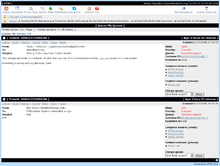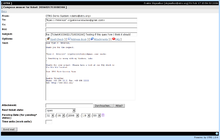| Revision as of 08:59, 26 March 2007 editLuk (talk | contribs)Edit filter managers, Autopatrolled, Administrators44,788 edits linking to Misplaced Pages:OTRS i at the top of the page, as it is usually done← Previous edit | Revision as of 18:43, 26 March 2007 edit undoJeandré du Toit (talk | contribs)Autopatrolled, Extended confirmed users, Pending changes reviewers18,684 edits ←Undid revision 117953420 by Lucasbfr (talk) rv per WP:SELFNext edit → | ||
| Line 1: | Line 1: | ||
| {{for|OTRS in the context of Misplaced Pages|Misplaced Pages:OTRS}} | |||
| '''OTRS''', which is short for ''Open-source Ticket Request System'', is an ] ] package which a company, organisation or institution can use to assign tickets to incoming queries, thereby greatly facilitating the handling of support requests and other customer traffic. | '''OTRS''', which is short for ''Open-source Ticket Request System'', is an ] ] package which a company, organisation or institution can use to assign tickets to incoming queries, thereby greatly facilitating the handling of support requests and other customer traffic. | ||
Revision as of 18:43, 26 March 2007
OTRS, which is short for Open-source Ticket Request System, is an open-source software package which a company, organisation or institution can use to assign tickets to incoming queries, thereby greatly facilitating the handling of support requests and other customer traffic.

In general
Like other Trouble Ticket Systems, OTRS does much more than only dealing with mail boxes: for every ticket there is a history, showing what happened to the ticket within its life cycle. OTRS puts multiple requests for the same incident together, thus making it possible to work on an incident rather than on singular requests. OTRS is a multiuser system which means that multiple agents may work simultaneously on the tickets in OTRS, reading the incoming messages, bringing them in order, and answering them. OTRS is highly scalable, capable of handling thousands of tickets per day and a nearly unlimited number of simultaneously working agents.
OTRS has integrated functionality for creating, reworking and searching FAQ texts. The FAQ texts may be incorporated into the agents' answers on tickets.
By using a multilingual web user interface OTRS is usable independently from the respective operating systems since it's operated from a web browser. Furthermore, this facilitates the usage of OTRS by external agents or even customers participating in working on or contributing to tickets.
OTRS establishes a framework of functions. For example, the incident handling system SIRIOS of BSI, Germany, is based on OTRS.

History
The OTRS.org project was founded in 2001 by Martin Edenhofer. OTRS today is installed over 35,000 times world wide.
| Version | Date | Comment |
|---|---|---|
| 0.5 | 2002-04-09 | First official version of OTRS is available. Core system is up and running. |
| 1.0 | 2003-02-14 | After 2 years of development, the first stable version of OTRS is released. |
| 1.1 | 2003-05-01 | Many improvements in backend and user interface. |
| 1.2 | 2004-02-16 | 5 new languages, a new FAQ database, utf8 support and Single-Sign-On. |
| 1.3 | 2004-09-22 | A new stats-framework and a timezone feature. |
| 2.0 | 2005-08-01 | After 5 years of development OTRS 2.0 is released. OTRS is available in 19 languages. Key features are PGP, S/MIME, an XML database interface, an application package manager to install additional applications via a web repository. |
| 2.1 | 2006-10-05 | Performance gains claiming 10% improvement overall and 50% on search. Improved support for Microsoft SQL Server, Calendar improvements, improved LDAP support, increased PDF output support, Persian language support. |

Technology
Since its beginnings OTRS has been implemented in the programming language Perl. The web interface is made more user-friendly by using JavaScript (which can be switched off for security reasons). OTRS' different functionalities are implemented as backend modules which can be reused. Thus, it is easy to write one's own modules to extend the functionality of the OTRS system.
The web interface itself uses its own templating mechanism called DTL (Dynamic Template Language) to facilitate the display of the systems output data.
Originally, OTRS worked only on MySQL databases. Since that time, support has been added for PostgreSQL, Oracle, DB2 and Microsoft SQL Server. OTRS may be used on many UNIX or UNIX-like platforms (e.g. Linux, Mac OS X, FreeBSD, etc.) as well as on MS Windows.
The scalability of OTRS systems may be increased by using mod_perl for the Apache Webserver or by separating database and web server system, allowing a large number of simultaneously working agents and high volumes of tickets.
In UNIX and UNIX-like environments OTRS works closely with system programs like the mail transfer agent Postfix or the mail filter procmail.
See also
External links
- OTRS.org – Projectsite
- OTRS GmbH
- OTRS.nl – Projectsite (Dutch)
- otrs.kidanet.com – Projectsite (Japan)